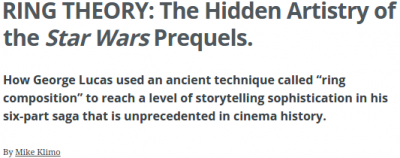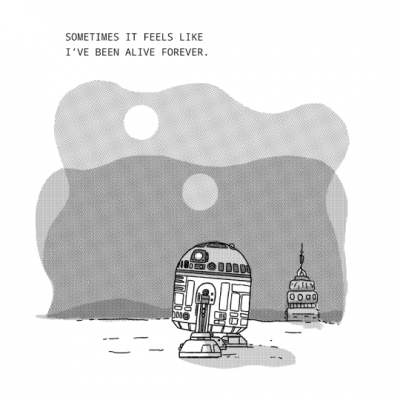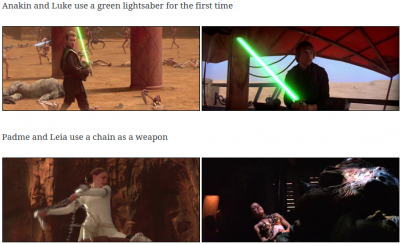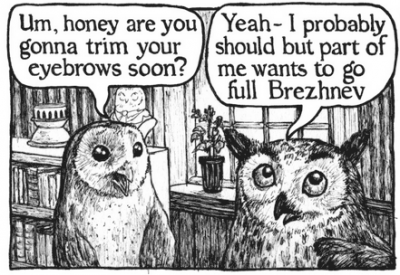I really enjoyed this short comic by Paperbeatsscissors! It features a star war. Click through to read the whole thing.
blog: things you should check out
Here Is The Soulful Acoustic Smash Mouth Cover You Didn’t Know You Wanted
Here it is. (by Marlee Goldman)
Three Fun Short Videos I Liked
Here are a few different ways to while away your life, a few minutes at a time! I did the same with these interesting videos, and now I’m passing the technique on to you.
ONE MINUTE TIME MACHINE : A short film about time travel. A very fun take on the Groundhog Day style concept of trying over and over to get things right. (Some NSFW language.)
GLEN KEANE: STEP INTO THE PAGE : Master Disney artist Glen Keane (the animator of Ariel, the Beast, Tarzan, etc.) puts on an Oculus and draws in 3-D space. Such a neat video.
HELL’S CLUB : Dance club scenes from a ton of different movies, edited together into one long scene. Surprisingly… amazing??
The Theory that Claims the Star Wars Prequels Are Too Sophisticated for Us to Fully Understand

In his extremely long and detailed essay “Star Wars Ring Theory”, Mike Klimo argues for a reexamination of the Star Wars prequel movies.
They are, he claims, not semi-competent jangles of garish noise and wooden acting, but in fact, incredibly sophisticated examples of modern mythmaking, and work with the original Star Wars movies to create an interwoven narrative web more complex than has ever been achieved in the history of cinema.
If you like Star Wars and wild theories, this is a great read. I don’t have much love for the prequel movies myself, but after reading Klimo’s essay, I can absolutely look at them with a deeper appreciation, recognizing that a very precise craftsmanship has gone into making them exactly…whatever they are.
Klimo claims in the essay that George Lucas, using “ring theory” (a storytelling concept that involves recurring motifs and patterns), has created in the six Star Wars movies a tightly woven narrative in which no detail is insignificant.
He supports this with examples of mirrored compositions, plot structures, story beats, and lines of dialogue from the various movies (I’ve used some of his juxtaposed images in this post). And seeing the evidence in living color, it’s hard to deny: a lot of thought went into making elements of the prequels reprise (foreshadow?) moments from the original trilogy.
I have some thoughts about the conclusions he reaches, though. I’ll let you go and read the essay, and then come back when you’re done, maybe next week sometime, and read the rest of this post.
Back? Okay. As I mentioned above, it’s clear that absolutely, unequivocally, there are moments and shots and entire sequences in the prequels that are designed to evoke counterpart moments and shots and sequences from the original trilogy.
Klimo’s argument is that this proves that all six movies are interlocking parts of a supremely orchestrated master saga…Which might make sense if the original ones weren’t made decades before the prequels, and if Lucas had himself directed all of the original movies.
What makes more sense to me is that, faced with the prospect of making prequel movies, and not wanting to screw it up, Lucas looked back at the original trilogy, and mined it.
In improv theater we have a technique: to make a mistake not look like a mistake, you simply repeat it. Then, it looks like it was a deliberate move all along.
By making movies that were, as close as he could manage, repetitions of motifs from the original movies, Lucas created the intricate interrelated structure that Klimo is so taken with — by filling in the missing pieces after the fact.
It’s kind of like a Rorchach test: it’s just a blob of ink, until you fold the paper in half. Once you mirror the pattern and start repeating things, every detail starts to look meaningful.
Some of the comments on the Ring Theory website point out a similar point: that no matter how intricate a structure the prequels can be shown to have, they’re still, to coin a phrase, semi-competent jangles of garish noise and wooden acting.
The response to this, in that comment thread at least, is that the prequels are meant to read as myths — “You don’t criticize the dialogue in the Bible, do you?” is a paraphrase of one comment.
To which I say: FAIR ENOUGH. Klimo claims to be at work on a follow-up article exploring this point in more depth.
But! I will also say this. I followed a link from Klimo’s article’s bibliography to an obscure journal of philosophy, which also features (besides the article that Klimo references) an article entitled “Nazi Germany: The Forces of Taurus, Scorpio and Capricorn”.
This article is exactly as impassioned and elaborate and detail-filled in the service of arguing the astrological links between the key figures and events of the Third Reich as Klimo’s article praising Lucas as the most sophisticated storyteller in the cinema history.
It’s like Chancellor Palpatine said: “It’s not what you know, it’s what you can prove.”
Check out: Crawdads Welcome
I came across this comic series when someone mistook it for Wondermark. It’s so lovely! And hand-drawn, which Wondermark isn’t really…I mean, someone drew it, but not me. Wondermark is A COLLABORATION WITH THE DEAD
The above is just a single panel, check out the whole series on Tumblr: Crawdads Welcome, a comic strip about animals by Ezra Butt.







